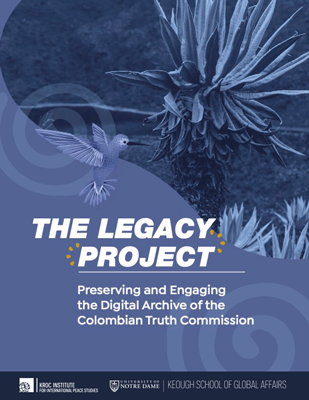Preserving and Engaging the Digital Archive of the Colombian Truth Commission
The Legacy Project at the University of Notre Dame shares with the world a myriad of narratives and memories compiled by the Colombian Truth Commission about the country’s 52-year armed conflict to advance transitional justice, human rights and the centrality of victims.

The Legacy Project celebrates the Truth Commission’s inspiring research efforts, making its archives available for study and creative practice in order to shape peacemaking and peacebuilding efforts around the world.
The Legacy Project guarantees continued access to researchers, educators, scholars, policymakers, peacebuilders, artists and creators, to the vast collection of more than 200,000 files including audiovisual, non-textual knowledge and digitized documents about the Colombian civil war and peace process collected under the mandate of the Truth Commission. The transmedia archive comprises the narratives and voices across classes, territories, ethnicities, races and genders of the victims and witnesses of the armed conflict as well as those responsible for it.
Truth commissions play a critical role in transitional justice and reconciliation, focusing on the past to investigate patterns of victims of armed conflict. The Colombian Truth Commission is an exemplar of best practices of inquiry and recommendations for non-repetition, paving the way for reconciliation and peacebuilding. The Legacy Project celebrates these research efforts by making the resulting archives globally available for study and creative practice with the hope of informing peacemaking and policies around the world.
The Colombian Truth Commission
As outlined in the Colombian Final Accord, signed in 2016 by the Colombian government and the former FARC-EP guerrillas, the Truth Commission sought to clarify the patterns, causes and explanations of the armed conflict in light of the rights of victims, society and the world the right of victims, society, and the world to know the truth. Its work promoted recognition of the events of the armed conflict, as well as peaceful coexistence across the country’s territories, and contributed to laying the foundations for non-repetition, through a process of broad and inclusive participation in the building of a stable and lasting peace.
In August 2022, the Truth Commission fulfilled its mandate, which culminated in a trove of audiovisual and textual narratives drawn from Colombian society and a report poised to guide the national and international agenda to consolidate peace. The work of the Truth Commission focused broadly on the events of the armed conflict and the violence that affected Colombian society: women and children, ethnic and cultural groups and vulnerable persons such as elderly and differently-abled persons. Today, efforts to address issues of social justice, environmental conservation and security follow the Truth Commission’s example in recognizing the centrality of victims.
With the Legacy Project, the University of Notre Dame advances a commitment to Integral Human Development after conflict and contributes to lessons about peace processes, reconciliation, clarification and preservation of the truth.
Learn More


